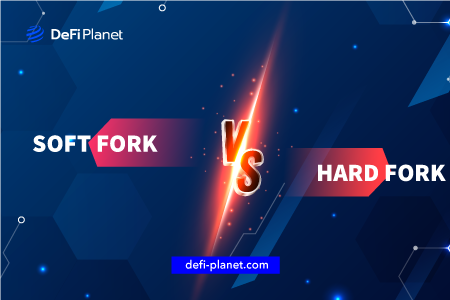In the blockchain space, forks happen for different reasons. A fork may occur as a result of the requirement to implement a protocol update. For example, the Alonzo hard fork was conducted to integrate smart contract functionalities into Cardano. A fork may also occur because a group of people disagrees with the direction of the project. A classic example is the split of Ethereum into Ethereum and Ethereum Classic.
A fork may also be caused by a bug in the software. For example, the Ethereum Classic hard fork was caused by a bug in the Ethereum Classic software. A fork may result in the creation of a new cryptocurrency. For example, Bitcoin Cash was created as a fork of Bitcoin. A fork can also be caused by an attack on the network. Sometimes, a fork may happen if multiple blocks have similar heights.
This article comprehensively analyzes the definitions of forks, hard forks, and soft forks.
What is a Fork?
A fork occurs when the consensus mechanism that governs the blockchain is altered. It could be accidental or intentional. A fork occurs when multiple miners discover a block at the same time.
In this situation, the fork is resolved when new blocks are introduced to the network, making one block longer than the others.
Typically, the network prefers blocks that form the longest chains while ignoring shorter ones, which subsequently become orphaned blocks.
Because the network eventually corrects itself, this is also known as a temporary fork. If it is an intentional fork, it is classified as either a “hard fork” or a “soft fork.”
Intentional forks are intended to change the protocol’s architecture for a specific reason.
Cardano, for example, used the Alonzo hard fork to intentionally incorporate smart contracts into its blockchain.
What is a Hard Fork?
A hard fork is an intentional fork that results in a change in the protocol’s architecture, requiring every node to update its software to the most recent model. If a blockchain splits from an existing network and exists independently, it may not be considered a hard fork.
Every node in the new blockchain had to update the rules and stop accepting the guidelines that were previously available.
This means that the new network is distinct from the old one, and transactions in one have no effect on blocks in the other.
The two independent blockchains share a common element, which is their shared history.
Hard forks can be utilized to increase the network’s scalability and even security.
For example, the bitcoin network has been subjected to some hard forks in the past. Bitcoin Cash is one of them. When some bitcoin users felt that the network’s rules should be changed, they opted to perform a hard fork, which resulted in the creation of Bitcoin Cash. Though the origin of Bitcoin Cash is similar to that of Bitcoin, they are not the same. Bitcoin and Bitcoin Cash co-exist.
Hard forks are performed for different reasons. It could be done to improve network security.
If bugs or vulnerabilities are discovered in a blockchain, the community can opt to perform a hard fork to correct these. It may be done to reverse transactions in some cases. This occurred when the Ethereum network performed a hard fork to reverse the attack on The DAO.
Popular Examples of Hard Forks?
A hard fork has occurred several times in the past for various reasons. For example, Ethereum had a hard fork that split the blockchain into Ethereum and Ethereum Classic.
In 2016, the DAO, an Ethereum-based platform, was hacked, and a debate ensued to address the situation. Some crypto enthusiasts argued that the hack should be reversed, while others believed that the opposite should occur. The latter argued that undoing the hack would negate the idea of the blockchain’s immutability.
Another well-known example of a hard fork was the split of Bitcoin into Bitcoin and Bitcoin Cash in 2017. The cause of the split was that one group believed that SegWit was the best option for improving transactions by increasing the number of transactions that could be processed by a block.
Crypto enthusiasts who were dissatisfied with the SegWit solution chose a solution that entailed expanding the block size from the standard 1 MB to 8 MB.
The SegWit-enabled blockchain retained the name “Bitcoin,” while others altered the block size to create Bitcoin Cash.
The Altair hard fork, which happened in October 2021, was one of the milestones that marked Ethereum’s transition from the Proof-of-Work consensus mechanism to Proof-of-Stake.
What is a Soft Fork?
Soft forks are minor alterations made to a blockchain, and their consequences are not as severe as hard forks. Soft forks do not split the blockchain into multiple networks, and there is no independent element. Usually, the alterations do not affect the chain’s previous model.
Soft forks, like hard forks, introduce new rules, but the new rules do not override the old rules.Soft forks are used when it is necessary to integrate a new feature that will not dramatically alter the network’s composition or cause conflicts between the new and old rules. When a soft fork occurs, the new nodes introduced into the network as a result of the soft fork typically eliminate the existing nodes that are no longer needed in the network.
An Example of a Soft Fork?
Integrating SegWit into Bitcoin is a well-known example of a soft fork.
For a long time, there have been discussions about how to improve the Bitcoin blockchain.
At the same time, several enthusiasts were contemplating ways to improve the network’s transaction speed. A school of thought proposed increasing the number of transactions that could be processed in each block. This inspired the creation of SegWit, or Segregated Witness, which was designed to increase the amount of space in each block to accommodate more transactions. SegWit’s implementation was backward compatible, as were prior soft forks.
Differences Between a Hard Fork and a Soft Fork?
Though hard forks and soft forks may lead to the alteration of networks, they are different.
• Independence
Hard forks involve an overhaul of the code, resulting in the creation of multiple independent blockchains. These chains operate in parallel and are different from one another. The only thing they have in common is a shared history. Aside from that, they are distinct.
In the case of a soft fork, modifications are made to the network and are adopted by all users. There is no new chain created.
• Advanced features
If the network requires more advanced functionalities, a hard fork may be performed rather than a soft fork.
• Work needed
Implementing a hard fork requires more effort compared to its counterpart. Typically, the former requires a higher amount of computing power.
What is a Spin-off Coin?
Although the two major types of intentional forks are hard forks and soft forks, there are others. A Spin-off Coin is created by using the open-source code of an existing cryptocurrency to create a new token. One example is Litecoin, which was created using Bitcoin’s open-source code.
In Conclusion,
- Forks alter the operations of alteration networks.
- It can be an accidental or intentional fork.
- Intentional forks are categorized into hard forks or soft forks.
- Hard forks result in the creation of a new blockchain.
- Soft forks do not result in the creation of an independent network.
If you would like to read more articles like this, visit DeFi Planet and follow us on Twitter, LinkedIn, Facebook, and Instagram.




















